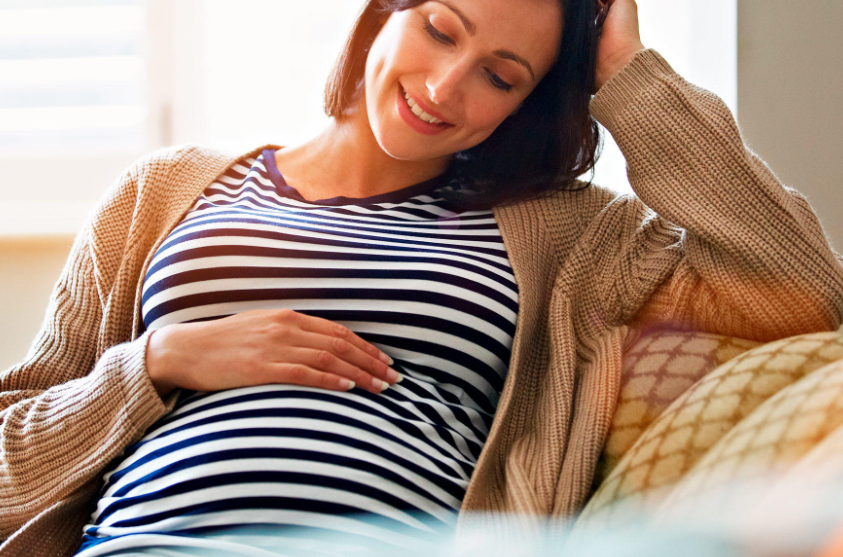How good is your memory? Like, try to remember this list of words:
你的記憶力有多好?比如,試著記住這個單詞表里的單詞:
weather, snacks, cousin, cherry, floor, boats.
天氣、小吃、表弟、櫻桃,地板、船。
Okay, can you repeat that back to me?
好的,你能再說一遍嗎?
Whether you're generally good at memorizing things or not, if you're pregnant or recently had a baby, this task might be a little trickier.
無論你是否善于記憶,如果你懷孕或最近生完孩子,這項任務可能會有點棘手。
That's because many pregnant people experience a foggy memory that can last for years after the pregnancy ends.
這是因為許多人懷孕后記憶會模糊,這種情況在懷孕結束后可能會持續數年。
This phenomenon has a number of names: "momnesia," "mom brain," "baby brain," "pregnancy brain".
這種現象有許多叫法:“失憶癥”、“媽媽大腦”、“嬰兒大腦”、“懷孕大腦”。
And memory loss only scratches the surface of what's going on.
記憶喪失只是表面現象。
Turns out, to prepare for a baby, pregnancy actually remodels the human brain.
事實證明,為了備孕,懷孕實際上改造了人類大腦。
Pregnancy brain is best known for causing memory loss,
人們通常認為,懷孕大腦會導致記憶力下降,
but studies show that it can also involve sleepiness or fatigue, dips in attention, and slower processing speeds.
但研究表明,它還可能引起嗜睡或疲勞、注意力下降和處理速度較慢。
Pinning down the symptoms has been a challenge, partly because pregnancy can vary so much between people.
這些癥狀的確定一直是一項挑戰,部分原因是因為人們懷孕的差異較大。
For instance, those behavioral symptoms of pregnancy brain can start as early as the second trimester and last as long as two years after the baby's born.
例如,懷孕大腦的這些行為癥狀可以從妊娠中期開始,并且一直持續到嬰兒出生后的兩年。
Or they can start as late as the third trimester and end just a few days after childbirth.
或者從妊娠晚期開始,并在分娩后幾天結束。
Or there might be no symptoms at all!
或者根本沒有任何癥狀!
These variations can make it hard to get consistent experimental results.
這些差異造成試驗的結果很難一致。
But a 2012 study compared 19 years of research and found that pregnancy brain is a real,
但2012年的一項研究對比了之前19年的研究,發現懷孕大腦是真實、
measurable phenomenon that affects memory in a very specific way.
可測的現象,它以一種非常具體的方式影響記憶。
With other kinds of memory loss, like amnesia, people have a complete inability to form new memories.
在記憶喪失的情況下,比如健忘癥,人們無法完全形成新的記憶。
But with pregnancy brain, it's harder to form certain types of memories.
但在懷孕大腦的作用下,形成某種記憶更加困難。
Specifically, memories that require effortful processing—like when you're actively trying to memorize information.
具體而言,需要努力處理的記憶 ——比如當你努力積極記憶信息的時候,
So this includes memory tasks like free recall, where you remember a list of items or words, one at a time.
包括記憶任務,比如自由記憶,一次記住項目列表或單詞表。
There's also delayed free recall, where you can remember information after some time or after a distraction.
還有延遲自由記憶,你可以在一段時間或分心后記住信息。
Like whether you can remember the list from the beginning of this video—I know I can't!
就像你是否能記住這段視頻開頭的單詞一樣 —— 我知道我不能!
None of them. Boats? Was boat one of them? And then there's prospective memory, where you remember to do something in the future—
都不是。船?船是其中一個嗎?然后是前瞻記憶,你記得未來要做的事兒——
like deciding to make mashed potatoes for dinner, and then you remember to stop at the store on the way home from work.
比如決定晚餐做土豆泥,然后記得下班回家的路上去商店看看。
It's unclear why these specific types of memory are affected, but we have some ideas as to how memory loss can happen,
目前還不清楚為什么這些特定的記憶會受到影響,但我們對記憶喪失的產生有一些想法,
because there are measurable changes in the brain.
因為大腦中有可測變化的存在。
During pregnancy, brain changes are ultimately driven by sex hormones like estrogen, progesterone, and prolactin.
懷孕期間,大腦變化基本上受雌激素、黃體酮和催乳素等性激素的影響。

These hormone levels rise to super high concentrations during pregnancy, and fluctuate a lot during the third trimester.
懷孕期間,性激素濃度升至超高水平,并且在妊娠晚期波動幅度較大。
As this happens, the amount of some neurotransmitters also changes—
這種情況發生時,神經遞質的數量也會發生變化——
including a decrease in serotonin and dopamine, and an increase in norepinephrine.
包括血清素和多巴胺降低,去甲腎上腺素上升。
That norepinephrine boost, which signals the fight-or-flight response, is also linked to an increased memory loss.
指示戰斗或逃跑反應的去甲腎上腺素上升也與記憶喪失的增加有關。
And all these chemical brain changes play a role in physical changes during pregnancy—
懷孕期間的所有這些化學腦變化都影響著身體變化——
although scientists aren't entirely sure how everything's connected.
雖然科學家并不完全確定它們之間的關系怎樣。
See, researchers have found that pregnancy causes significant changes in gray matter—
研究發現,懷孕造成腦灰質發生重大變化
the regions where most neurons connect and talk to each other.
這個區域中大多數神經細胞連接互通。
An increase in gray matter volume can mean that an area needs to make more connections,
腦灰質體積的增加可能意味著一個區域需要建立更多的連接,
while a decrease can mean there's some fine-tuning going on, or a loss of information processing.
然而腦灰質體積的減少可能意味著某些微調正在發生,或者信息處理丟失。
But basically, changes in volume generally mean a shift in how the brain handles information.
但基本上來說,體積的變化通常意味著大腦處理信息方式的轉變。
A 2016 study published in Nature Neuroscience looked at the brains of 25 women who got pregnant for the first time, before and after they gave birth.
2016年發表在《自然神經科學》(Nature Neuroscience)雜志上的一項研究調查了25名首次懷孕女性分娩前后大腦的情況。
And they compared this MRI data to some scans of the brains of their male partners,
他們將這些核磁共振成像數據與其男性伴侶、
and the brains of women and men who didn't become new parents as controls.
以及那些還沒有做父母大腦的掃描結果進行了比較,
The researchers found that, during pregnancy, the cortical midline, hippocampus,
研究發現,懷孕期間,皮質中線、海馬體,
and areas of the prefrontal and temporal cortices had a significant loss of gray matter.
前額皮質和顳皮質區的腦灰質損失嚴重。
And this decrease in volume had a correlation with memory loss.
體積減少與記憶喪失有關。
But it was also linked to an increase in sensitivity to emotional cues from the baby and emotional attachment.
但也與嬰兒情緒暗示和情緒依戀敏感性的增加有關。
Specifically, there was a correlation between gray matter loss and higher marks on the Maternal Postnatal Attachment Scale—
具體而言,母體產后依附量表的較高分數與腦灰質損失之間存在相關性,
a 19-point questionnaire used to measure how well a biological mother bonds with her child.
該量表總分是19分,用于衡量生母與孩子之間的關系,
They also did a follow-up MRI scan on 11 of those new mothers,
他們還對其中11位新媽媽后續進行了核磁共振成像掃描,
and found that those brain changes can last at least two years after childbirth.
發現分娩后大腦的那些變化至少持續兩年。
And we're not sure how long it takes to get back to pre-pregnancy volumes of gray matter.
我們不確定需要多久才能恢復孕前腦灰質的體積。
But overall, pregnancy brain seems to be an evolutionary thing that helps the baby survive—
但總體而言,懷孕大腦似乎是一種進化,可以幫助寶寶生存——
kind of like how morning sickness is annoying but it can offer protection from toxins.
有點像晨吐,雖然很討厭,但可以保護孕婦免受毒素的侵害。
So meeting the demands of parenthood requires energy, time, patience, luck… and a little bit of brain remodeling.
因此,父母需要能量、時間、耐心、運氣......以及少許大腦重構。
Thanks for watching this episode of SciShow Psych!
感謝收看本期心理科學秀學!
If you want to learn more about how new babies seriously affect your brain after they're born, check our our video about that very thing!
如果您想了解更多關于新生兒出生后對大腦的影響,看看我們的視頻節目吧!


